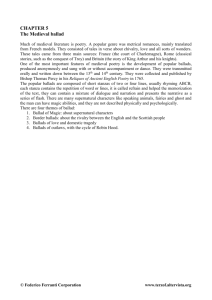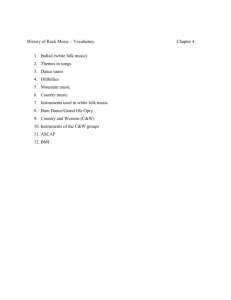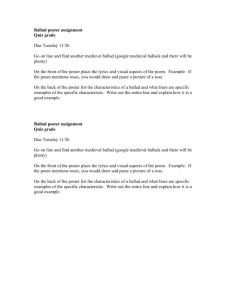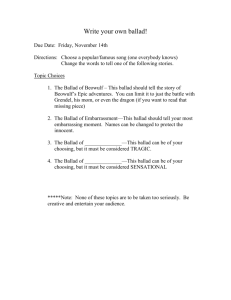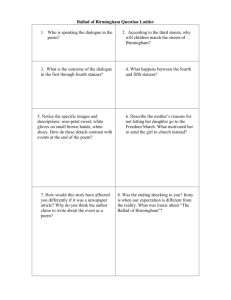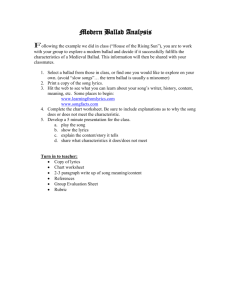Ballads
advertisement
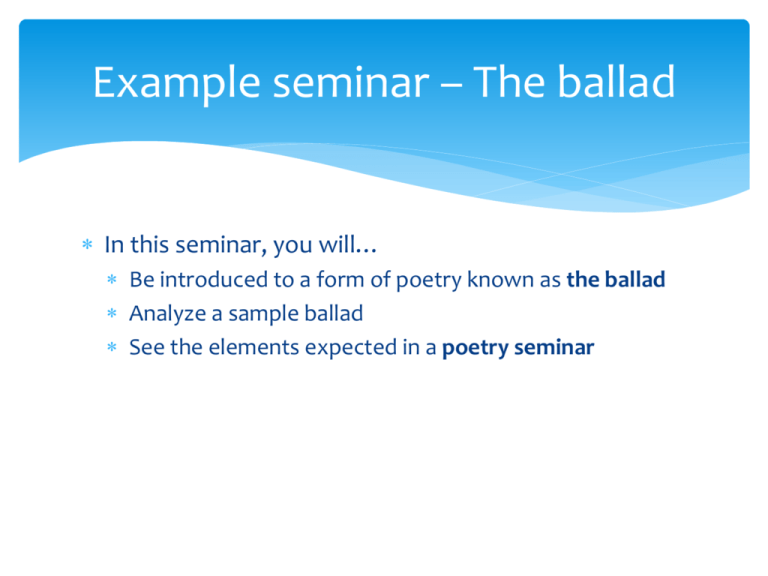
Example seminar – The ballad In this seminar, you will… Be introduced to a form of poetry known as the ballad Analyze a sample ballad See the elements expected in a poetry seminar What is a ballad? We tend to think of ballads as dramatic love songs fit for the divas of pop music The word ballad originally derived from an Old French word meaning “dancing song.” Listen to this modern example of a ballad What do you gather about this genre? In media res O, what can ail thee, knightat-arms, Alone and palely loitering? The sedge has withered from the lake, And no birds sing. - La Belle Dame Sans Merci by John Keats Ballads start quickly, without much introduction or narration What is troubling the knight-atarms? Why is he alone and hanging back? Why is nature silent? The ballad plunges into its subject, and leaves us with questions Two types of ballads Folk ballad A song/narrative poem transmitted orally that tells a story Focuses on one incident Begins in the midst of a crisis (in medias res) Proceeds to the resolution with little background information, character development, or descriptive detail Literary ballad are composed and written down by known poets, usually in the style of folk ballads Example: The Rime of the Ancient Mariner by Samuel Taylor Coleridge Early ballads Were often about Tragic love Domestic conflicts Wars Shipwrecks Sensational crimes Exploits of outlaws The sensational Just like today with tabloid headlines and soap operas, certain forms of popular entertainment tended toward the sensational. Plot Examples Three dead sons visit mother for dinner A maiden is headed for the gallows, and her family refuses to help Later ballads Historical events Romantic heroes These ballads were written toward end of the Middle Ages when English was accepted as a language of literary merit Structure of the ballad Typically Four lines per stanza Four accented syllables in lines one and three ABCB rhyme scheme "Mother dear, may I go downtown Instead of out to play, And march the streets of Birmingham In a Freedom March today?" - “Ballad of Birmingham” by Dudley Randall The Rime of the Ancient Mariner He holds him with his glittering eye The Wedding Guest stood still, And listens like a three years’ child: The Mariner hath his will. The Wedding Guest sat on a stone: He cannot choose but hear; And thus spake on that ancient man, The bright-eyed Mariner. Ballad passages In a group of four, determine the rhyme scheme of the ballad passage you’ve been given Be prepared to share your findings Ballad passages Result: There are a variety of possible rhyme schemes Takeaway: The ballad maintains a story and a pattern Stock descriptive phrases A word or phrase habitually used by a group of people: a cliché Example: blood-red wine One less thing for the singer to remember Refrain in each stanza (repetition) Contributed to the song’s rhythm and reinforced its theme Provided the singer with time to think of the next verse Incremental repetition A line or stanza is repeated, but with an addition that advances the story Characteristics Treats a highly dramatic situation in the simplest language Uses a considerable amount of dialogue (sometimes local dialect) Deal with Strong elemental passions of humanity Powerfully depicted love Hatred, faith, revenge, fear, courage, loyalty Many involve the supernatural and end tragically Long Black Veil "Long Black Veil" is a 1959 country ballad written by Danny Dill and Marijohn Wilkin and originally recorded by Lefty Frizzell Listen to this version of the ballad as performed by Mick Jagger and The Chieftains In a group, look closely at the lyrics Summarize the story that is told in a few sentences The plot A saga song, "Long Black Veil" is told from the point of view of an executed man falsely accused of murder. He refuses to provide an alibi, since on the night of the murder he was having an affair with his best friend's wife, and would rather die and take their secret to his grave than admit the truth. The chorus describes the woman's mourning visits to his gravesite, wearing a long black veil and enduring a wailing wind. Ballad conventions Story begins in media res Third person narration Dramatic storyline Rhyme scheme Theme of death and loss Poetry seminar In a presentation of 10-12 minutes, Brief introduction to the poet Introduce genre Reading and/or presentation of the poem Explanation of the meaning of the poem How does the poem reflect the conventions of its genre? Analysis of literary devices Brief personal response

